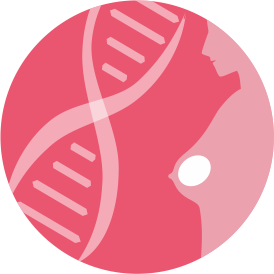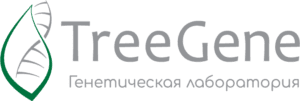| Determination of polymorphisms in BRCA1, BRCA2, CHEK2 genes | Price 37 800 tenge |
 Genetic testing for breast cancer can help women find out if they have inherited a genetic change (polymorphism) that makes them more likely to develop breast or ovarian cancer.
Genetic testing for breast cancer can help women find out if they have inherited a genetic change (polymorphism) that makes them more likely to develop breast or ovarian cancer.
Detection of the mutation allows a number of preventive measures to be taken to prevent or diagnose the disease as early as possible.
Biomaterial Venous blood with EDTA. No special preparation for the study is required. Turnaround time 14 working days
The mutations we investigate
- Mutation - 1 BRCA1 185delAG

- Mutation - 2 BRCA1 5382insC
- Mutation - 3 BRCA1 Cys61Gly
- Mutation - 4 BRCA1 4153delA
- Mutation - 1 BRCA2 6174delT
- Mutation - 1 kinase control 1100 delC cell cycle point CHEK2
- Mutation - 2 kinase control IVS2+1G>A cell cycle point CHEK2
Who is eligible for genetic testing?
Not all cancers are caused by inherited mutations, and the propensity for the disease is not always hereditary. This can only be determined by a specialist. Preferably, the decision on whether genetic testing is advisable should be made by an oncologist after a thorough review of the family tree.
It is necessary to think about visiting a geneticist and about the possibility of testing for a mutation in the BRCA genes in yourself and your relatives with one of the indications listed below:
- There was at least 1 case of BC and/or OC in the family;
- There have been cases of bilateral (bilateral) breast cancer in the family;
- There have been cases of breast cancer in the family before the age of 50.
Mutations in the BRCA gene are inherited in an autosomal dominant pattern, so all blood relatives of BRCA mutation carriers are also very likely to be carriers of this mutation. They are the highest risk group for BC, with a lifetime probability of developing malignant tumors of up to 90%. This is why it is extremely important for these people to have molecular genetic testing to answer the question of whether they are carriers of the mutation.
The benefits and necessity of genetic testing:

- Analysis of mutations in BRCA genes can identify healthy people who are up to 90% likely to get cancer.
- Analysis of frequent mutations in BRCA genes is an affordable and accessible procedure.
- Healthy people with mutations in the BRCA gene need special preventive measures for early detection of malignancy.
This observation will make it possible to diagnose the tumor in its early stages, when the patient himself due to the asymptomatic course of the disease is not aware of its onset. Early detection and treatment of the tumor prevents the formation of metastases, makes the surgery less traumatic for the patient, allows you to start effective therapy with the most modern drugs. According to statistics, timely detection of mammary gland tumors allows about 90% of patients to avoid severe consequences and lead a full life.
Recommendations for patients
It is extremely important to know that detection of a mutation is not a fatal sentence. On the contrary, the identification of the mutation allows the physician and the patient to take effective measures to prevent the development of the disease.
Because of the high risk of developing BC, carriers of mutations in the BRCA genes should absolutely take a package of preventive measures to diagnose the disease at an early stage. It is advisable to consult with a specialist oncologist who specializes in working with carriers of BRCA/RBC predisposition mutations.
Recommendations for prevention of BC/RBC in carriers of BRCA mutations:
- Breast self-examination - from 18-20 years old (monthly)
- Clinical examination - mammary glands and ovaries from 25-35 years old (1-2 times a year)
- Mammography - from the age of 35 (annually)
- Ultrasound - from 25-35 years old (1-2 times a year)
- NMR tomography - from 25-35 years old (annually)
- CA 125 monitoring from 25-35 years old with indications
- Prophylactic mastectomy (with reconstruction) - by indication
- Prophylactic oophorectomy (in postmenopause) - by indication
Results
No mutation detected - the risk of developing breast and ovarian cancer is within the range of general population values.
Detection of mutations in BRCA1, BRCA2, CHEK2 genes - the risk of developing breast and ovarian cancer is significantly higher than general population values.
FURTHER INFORMATION
![]() Articles
Articles
- Article "Breast and ovarian cancer risk caused by BRCA1, BRCA2, CHEK2 gene mutations" >> August 2013, KMZ (Kazakhstan Medical Journal)
- Lecture by Vladimir Katanaev on modern approaches to cancer drug development, delivered on November 11, 2010 MEDICATIONS AGAINST CROSS
![]() Video
Video
Hereditary breast and ovarian cancer syndrome

